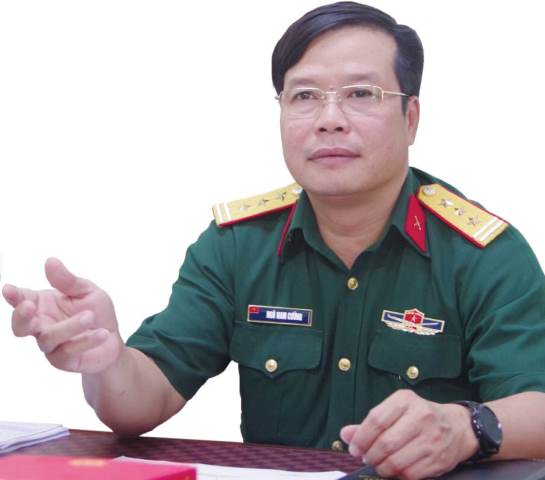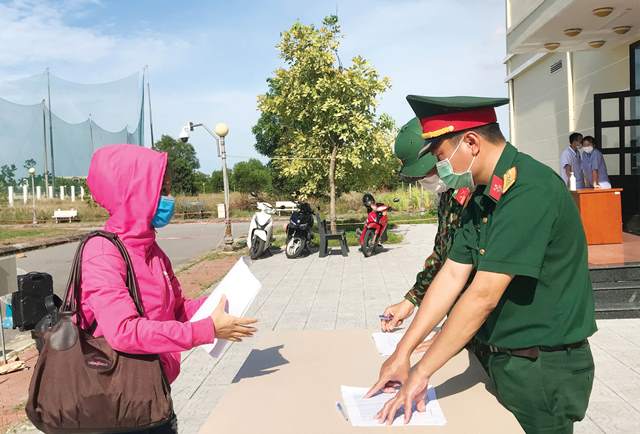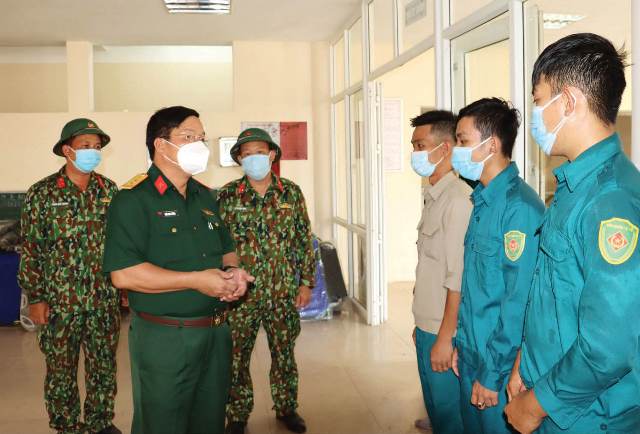
S. L. Colonel Ngo Nam Cuong, Commander of the Provincial Military Command
Sir, how did the Provincial Military Command race against time to prepare quarantine areas with adequate facilities?
When the new pandemic wave broke out in the southern provinces, the Provincial Steering Committee for COVID-19 Prevention and Control anticipated the situation. The Provincial Military Command had planned for preparation of quarantine areas. Due to the massive number of people returning from the epidemic area, the provincial armed forces really had to "race" against time.
Once the province had determined the locations to be requisitioned as quarantine areas, the Provincial Military Command immediately took action. To shorten the preparation time, all units were involved.
The Provincial Military Command also closely cooperated with relevant sectors, so that when the requisitioned quarantine areas come into operation, electricity and running water would be guaranteed for quarantined people. We also received support from different organizations.

Issuing certificates of quarantine completion to citizens. Photo: THANH THAO
At present, there are 16 provincial quarantine zones and 50 quarantine points at district, town, and city levels managed by the Provincial Military Command. The quarantine areas are operated and managed by the Provincial Military Command to ensure the wellbeing of quarantined people. It also coordinates with health authorities in receiving and monitoring the daily health of quarantined people.
A series of quarantine areas being established in a very short time means that a shortage in manpower is inevitable. How has the Provincial Military Command solved this difficulty?
The Provincial Military Command has mobilized all forces from the standing army to the self-defense militia and the Reserve. Although the number of militiamen mobilized in this phase is very large, with more than 500 soldiers, there are backup plans and reserve forces in localities ready for unexpected missions.
In addition, for the quarantine areas to operate smoothly, the management teams include staff with extensive experience from previous waves of the epidemic. Once the service teams are used to the work and the quarantine areas run smoothly, we will reduce the force to spare human resources for any new quarantine areas.
In addition, to reduce the stress on manpower, especially logistics personnel, the Provincial Military Command has organized centralized kitchens located outside the quarantine area. These kitchens can cater to multiple quarantine areas. Thus, we can not only reduce the number of people in the kitchen management team but also mobilize the participation of unions, associations, groups, etc., since these kitchens are safe from disease infection.
There has been cross-infection among quarantined people and the frontline force has also been infected. How are safety measures being tightened in the quarantine areas?
In any "battle", we always determine there will be casualties and risks. Therefore, we have plans to minimize those risks, but we absolutely must not be negligent and complacent.
When the frontline team is infected, the people involved are also quarantined immediately. It is the mechanism of “units isolated from units” in the quarantine areas which has been tightened from the beginning that has minimized risks, especially the risk for volunteers participating in logistics services.

S. L. Colonel Ngo Nam Cuong inspecting the operation of the quarantine areas
Cross-infection had also been expected, so when it happened, we localized and suppressed infection at that location. In addition, we further tighten epidemic prevention measures as well as strengthen disinfection and sanitation of the quarantine area, ensuring epidemiological regulations in the quarantine rooms.
Faced with work pressures, what specific policies and actions does the Provincial Military Command have to motivate the frontline staff?
Some officers and soldiers have not been home for a few months. Some were even not able to visit their sick parents. Many militiamen are the main breadwinners in the family, but when they received orders, they enthusiastically participated in the fight against the epidemic.
In order for officers and soldiers to feel secure in their tasks on the front lines, leaders of the Provincial Military Command visited the homes of officers and soldiers in difficult circumstances to encourage and give gifts to support their families.
For the militiamen who are the breadwinners of the family and are deployed on duty in the quarantine areas, we have discussed with them to send the regime allowance money home to their families to cover their living expenses. Only then will the soldiers rest assured to complete their tasks.
In addition, every week, leaders of the Provincial Military Command go to the quarantine areas to check the service work as well as encourage the officers and soldiers in the quarantine areas.
What are your predictions of the epidemic in the coming time and what plans do the Provincial Military Command have to expand or maintain the quarantine areas?
In the coming time, the epidemic will still be very complicated and prolonged. The Provincial Military Command is a member of the Provincial Steering Committee for COVID-19 Prevention and Control, and we have also planned to join with the forces to hold each battle line against the epidemic. These include the people's awareness frontline; the quarantine frontline; the medical frontline and finally the frontline dealing with patients who died from COVID-19.
Whether we can win the war against the epidemic or not depends on our awareness of complying with epidemic prevention measures and not being negligent or complacent. When everyone complies with the Government's directives and regulations, the quarantine areas will be less overloaded. Especially when everyone complies with the regulations while implementing concentrated quarantine, especially the 5K regulation, cross-infection from the quarantine area will also be controlled.
Currently, some quarantine sites requisitioned from schools have been and are being returned. We have surveyed and will activate quarantine areas with a larger capacity, ensuring quarantine regulations. These areas can be used for an extended time with a capacity of about 1 to 2 thousand people. We will actively prepare provincial quarantine areas with a capacity of 10,000 people.
Thank you Sir!
Interview by Thanh Thao